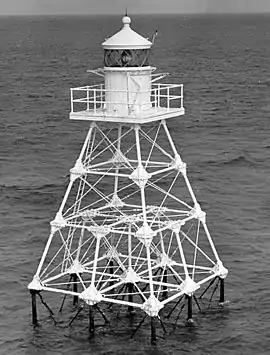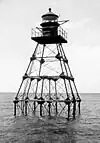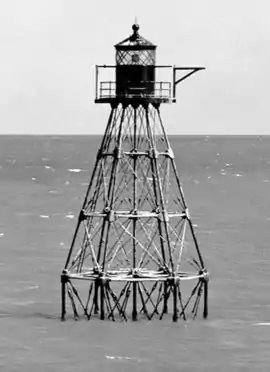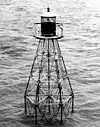Unmanned reef lights of the Florida Keys
The unmanned reef lights of the Florida Keys were navigational aids erected near the Florida Keys between 1921 and 1935. They were intended to mark local hazards and did not need to be visible for as far as the reef lights that were erected near the Keys during the 19th century.[lower-alpha 1] By the time the lights in this list were erected, older lighthouses were being automated, and these new lights were designed to be automated from the start. The lights resembled the older reef lights in having a wrought iron skeletal pyramidal structure on a screw-pile foundation. They all originally had lanterns on their peaks, so that they looked like smaller versions of the older reef lights, but had no keeper's quarters.[2][3]

The first two unmanned lights in the Florida Keys, the Molasses Reef Light and the Pacific Reef Light, were built as square pyramidal towers to the same plan in 1921. The Hen and Chickens Shoal Light was the smallest of these lights, and the only one built as a triangular pyramidal tower. It still exists, serving as a daymark. The lantern has been removed. A design for a standardized hexagonal pyramidal tower was developed in 1932 and used for the Smith Shoal and Tennessee Reef lights erected in 1933, and for the Cosgrove Shoal and Pulaski Shoal lights erected in 1935.[2][3]
List of lights
| Name | Tower shape | Height above water | Image | Original lens | Location | Year first lit | Original characteristic | Tower color | Water depth | Notes |
|---|---|---|---|---|---|---|---|---|---|---|
| Molasses Reef Light | Square pyramid | 45 feet (14 m) |  |
fourth order Fresnel lens | about 8 miles (13 km) southeast of Key Largo 25°22′N 80°09′W |
1921 | Flashing white | brown | 9 feet (2.7 m) | [4][lower-alpha 2] |
| Pacific Reef Light | Square pyramid | 45 feet (14 m) |  |
fourth order Fresnel lens | about 3 miles (4.8 km) southeast of Elliott Key 25°22′N 80°09′W |
1921 | Flashing white, 0.4 seconds | white | 7 feet (2.1 m) | [lower-alpha 3] |
| Hen and Chickens Shoal Light | Triangular pyramid | 35 feet (11 m) | range lens (300 mm) | 2 miles (3.2 km) southeast of Plantation Key 24°56′N 80°33′W |
1929 | Flashing red, 3 seconds | red | 19 feet (5.8 m) | [7][lower-alpha 4] | |
| Smith Shoal Light | Hexagonal pyramid | 49 feet (15 m) | fourth order Fresnel lens | about 11 miles (18 km) north-northwest of Key West 24°43′N 81°55′W |
1933 | Flashing white, once a second | white | 20 feet (6.1 m) | [lower-alpha 5] | |
| Tennessee Reef Light | Hexagonal pyramid | 49 feet (15 m) |  |
fourth order Fresnel lens | south of Long Key 24°45′N 80°47′W |
1933 | Flashing white, 0.3 seconds | black | 15 feet (4.6 m) | [lower-alpha 6] |
| Cosgrove Shoal Light | Hexagonal pyramid | 49 feet (15 m) | 200 mm | about 10 miles (16 km) west-southwest of Key West, south of the Marquesas Keys 24°27′28″N 82°11′06″W |
1935 | Flashing white: 4 flashes 0.4 seconds each, 3 eclipses 1.6 seconds each, 1 eclipse 5.6 seconds | red | 14 feet (4.3 m) | [12] | |
| Pulaski Shoal Light | Hexagonal pyramid | 49 feet (15 m) |  |
500 mm | about 30 miles (48 km) northwest of Key West, north of the Dry Tortugas | 1935 | Flashing white, flash 0.4 seconds eclipse 2.6 seconds | black | 15 feet (4.6 m) | [lower-alpha 7] |
Notes
- "Reef lights" refers to the skeletal towers erected in the second half of the 19th century in open water along the Florida Reef near the Florida Keys, including Alligator Reef Light, American Shoal Light, Carysfort Reef Light, Fowey Rocks Light, Sand Key Light, and Sombrero Key Light.[1]
- The light on the Molasses Reef tower has been replaced by a NOAA automatic weather station.[5]
- The Pacific Reef Light lantern was moved to a park in Islamorada, Florida. The light tower remains in use as a navigational aid.[6]
- The United States Lighthouse Society reports that a red, square, rectangular daymark with a "Lens Lantern" on top of a house existed at Hen and Chickens Shoal from 1899 until at least 1908.[8]
- The original Smith Shoal tower has been replaced by a columnar tower holding a NOAA tide gauge.[9][10]
- The Tennessee Reef Light still has its original lantern.[11]
- The original Pulaski Shoal tower has been replaced by a columnar tower holding a NOAA automatic weather station.[13][14]
References
- Dean, Love (1982). Reef Lights. Key West, Florida: The Historic Key West Preservation Board. ISBN 0-943528-03-8.
- "Historic Light Station Information and Photography: Florida". United States Coast Guard Historian's Office. Archived from the original on 2017-05-01. Retrieved June 29, 2008.
- Rowlett, Russ (July 24, 2014). "Unstaffed Offshore Lights of the Florida Keys". University of North Carolina. Archived from the original on March 15, 2018. Retrieved March 12, 2021.
- Buckler, Melissa (September 17, 2019). "Molasses Reef Light". U.S. Coast Guard Historian's Office. Archived from the original on December 23, 2021. Retrieved December 23, 2021.
- "Station MLRF1 - Molasses Reef". NOAA National Data Buoy Center. Archived from the original on December 16, 2021. Retrieved December 23, 2021.
- Buckler, Melissa (September 24, 2019). "Pacific Reef Light". U.S. Coast Guard Historian's Office. Archived from the original on December 23, 2021. Retrieved December 23, 2021.
- "Hen and Chickens Shoal Light". U.S. Coast Guard Historian's Office. November 1, 2019. Archived from the original on December 23, 2021. Retrieved December 23, 2021.
- "Hen and Chickens Shoal (Florida)". United States Lighthouse Society. Archived from the original on December 23, 2021. Retrieved December 23, 2021.
- "Smith Shoal Light". U.S. Coast Guard Historian's Office. November 1, 2021. Archived from the original on December 23, 2021. Retrieved December 23, 2021.
- "Smith Shoal Light, FL". NOAA Tides & Currents. Archived from the original on June 13, 2017. Retrieved December 23, 2021.
- Vincent, Marie (October 22, 2019). "Tennessee Reef Light". U.S. Coast Guard Historian's Office. Archived from the original on December 23, 2021. Retrieved December 23, 2021.
- "Cosgrove Shoal Light". U.S. Coast Guard Historian's Office. November 1, 2019. Retrieved December 23, 2021.
- "Pulaski Shoal Light". U.S. Coast Guard Historian's Office. October 7, 2021. Retrieved December 23, 2021.
- "Pulaski Shoals Light, FL". NOAA National Data Buoy Center. November 9, 2021. Archived from the original on December 22, 2021. Retrieved December 23, 2021.
